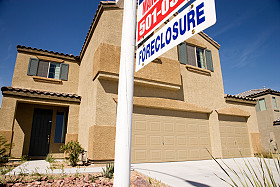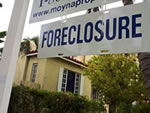Foreclosures
Foreclosure News Items
No shortage of short sale fraud
by Broderick Perkins
(8/26/2011) Short sales are rising and so are the number of opportunists taking advantage of underwater home sellers just trying to avoid foreclosure.

RealtyTrac recently reported short sales were up 19 percent to 102,407 the second quarter this year, compared to the first quarter.
While the number of short sales was down 12 percent from a year ago, short sales accounted for 12 percent of all sales, up from 10 percent a year ago.
A short sale occurs when the bank allows the sale of a home for less than the existing mortgage balance, typically, provided there's a qualified buyer in the wings. Home owners likely to seek short sales are often those floundering "underwater" with mortgage balances larger than the value of their home in a state of negative equity. Negative equity can occur because of a decline in value, an increase in mortgage debt or both. Many home owners suffer both because they used their home equity like an ATM machine during the housing boom. When housing crashed, values tumbled exacerbating the effects of equity-tapping. Short sales can be a better option than foreclosures for a consumer's credit history, depending upon how the lender reports the deal to credit bureaus. Instead of having the black mark of a foreclosure that can last seven years, short sellers may only take a credit score hit they can overcome in a few years.
Along with the recent rise in short sales, they are moving faster and with ever larger discounts, indicating the housing market is beginning to more efficienty clear out the inventory of distressed homes, according to James Saccacio, chief executive officer of RealtyTrac.
It's not surprising scam artists are after a piece of the action and get in with a scheme called "flopping," not to be confused with "flipping" or cashing in on low home prices by buying and quickly reselling for a profit.
Following in the footsteps of foreclosure rescue scams and mortgage modification schemes, floppers feverishly work the other side of the street and have become Public Enemy No. 1 to Freddie Mac's fraud investigation unit.
Freddie Mac says flopping occurs when real estate professionals don't disclose affiliations with other parties involved in the short sale transaction so they can rig the sale at a low price and hide better offers from the seller.
Freddie Mac says flopping requires cooperation of one or more real estate professional, perhaps the real estate agent, appraiser or both.
After the house is sold, the fraudster can flip it a few hours later for the better price and a quick profit. The seller, of course, gets the short end of the stick.
Freddie Mac says floppers' dirty tricks include:
• Falsely indicating on a short sale listing that there is an offer on a property in order to discourage legitimate offers and protect an accomplice's planned low bid.
• "Reverse staging," that makes the house look more distressed than it is, inflating repair estimates, or using similar tactics designed to obtain an artificially low home value.
• Flipping schemes. The fraudster buys a house at a short sale without putting down any of his own money and then sells it a few hours (or days) later to a legitimate buyer at a much higher price. The scheme uses falsified title and/or loan documents to fool the lender into approving the ultimate buyer's mortgage, which the fraudster uses to settle the earlier closing on the house he acquired at the short sale for a much lower price.
• Manipulating the HUD-1 settlement statement so the fraudster can skim away net proceeds from the sale for himself or other parties in the transaction without the sellers or investors knowledge.
To curb flopping, Freddie Mac requires all short sale transaction parties to sign an affidavit attesting that it is a true arms-length transaction. The affidavits help prevent fraud and gives Freddie Mac a stronger legal path to enforce the law.
Freddie Mac encourages anyone with information about floppers or flopping to call its Fraud Hotline at 1-800-437-2838, as well as your local FBI office, state attorney general, and local or state real estate regulator.
Other articles:
Investors better than banks, Feds at shrinking distressed inventory
Feds pondering how to unload government-owned distressed properties
Government considering new foreclosure plan
Big break for California short sellers
MARS' loan modification protections extend to short sales, other foreclosure relief
Refinance at Today's Low Rates!

